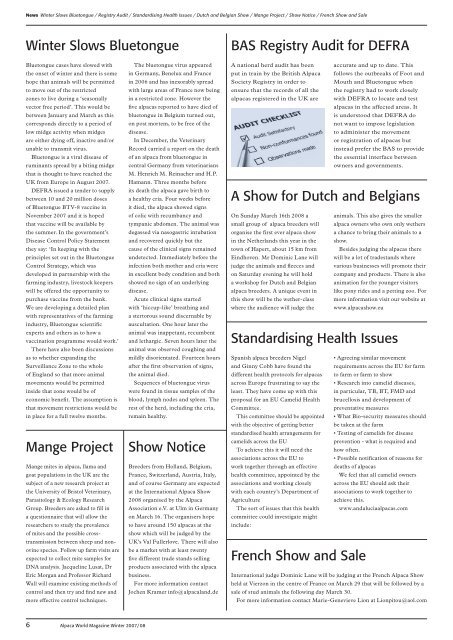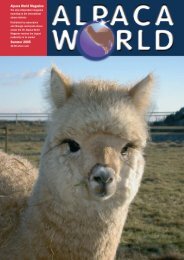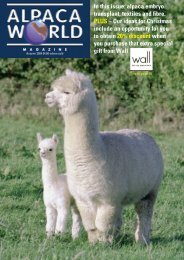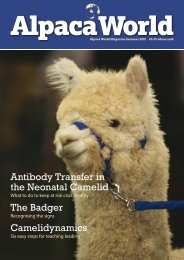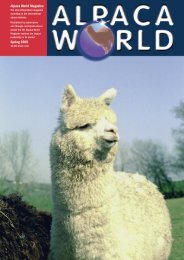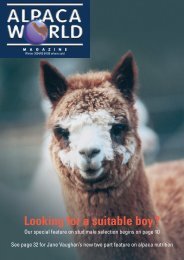Winter - Classical MileEnd Alpacas
Winter - Classical MileEnd Alpacas
Winter - Classical MileEnd Alpacas
Create successful ePaper yourself
Turn your PDF publications into a flip-book with our unique Google optimized e-Paper software.
News <strong>Winter</strong> Slows Bluetongue / Registry Audit / Standardising Health Issues / Dutch and Belgian Show / Mange Project / Show Notice / French Show and Sale<br />
<strong>Winter</strong> Slows Bluetongue<br />
BAS Registry Audit for DEFRA<br />
Bluetongue cases have slowed with<br />
the onset of winter and there is some<br />
hope that animals will be permitted<br />
to move out of the restricted<br />
zones to live during a ‘seasonally<br />
vector free period’. This would be<br />
between January and March as this<br />
corresponds directly to a period of<br />
low midge activity when midges<br />
are either dying off, inactive and/or<br />
unable to transmit virus.<br />
Bluetongue is a viral disease of<br />
ruminants spread by a biting midge<br />
that is thought to have reached the<br />
UK from Europe in August 2007.<br />
DEFRA issued a tender to supply<br />
between 10 and 20 million doses<br />
of Bluetongue BTV-8 vaccine in<br />
November 2007 and it is hoped<br />
that vaccine will be available by<br />
the summer. In the government’s<br />
Disease Control Policy Statement<br />
they say: ‘In keeping with the<br />
principles set out in the Bluetongue<br />
Control Strategy, which was<br />
developed in partnership with the<br />
farming industry, livestock keepers<br />
will be offered the opportunity to<br />
purchase vaccine from the bank.<br />
We are developing a detailed plan<br />
with representatives of the farming<br />
industry, Bluetongue scientific<br />
experts and others as to how a<br />
vaccination programme would work.’<br />
There have also been discussions<br />
as to whether expanding the<br />
Surveillance Zone to the whole<br />
of England so that more animal<br />
movements would be permitted<br />
inside that zone would be of<br />
economic benefit. The assumption is<br />
that movement restrictions would be<br />
in place for a full twelve months.<br />
Mange Project<br />
Mange mites in alpaca, llama and<br />
goat populations in the UK are the<br />
subject of a new research project at<br />
the University of Bristol Veterinary,<br />
Parasitology & Ecology Research<br />
Group. Breeders are asked to fill in<br />
a questionnaire that will allow the<br />
researchers to study the prevalence<br />
of mites and the possible crosstransmission<br />
between sheep and nonovine<br />
species. Follow up farm visits are<br />
expected to collect mite samples for<br />
DNA analysis. Jacqueline Lusat, Dr<br />
Eric Morgan and Professor Richard<br />
Wall will examine existing methods of<br />
control and then try and find new and<br />
more effective control techniques.<br />
The bluetongue virus appeared<br />
in Germany, Benelux and France<br />
in 2006 and has inexorably spread<br />
with large areas of France now being<br />
in a restricted zone. However the<br />
five alpacas reported to have died of<br />
bluetongue in Belgium turned out,<br />
on post mortem, to be free of the<br />
disease.<br />
In December, the Veterinary<br />
Record carried a report on the death<br />
of an alpaca from bluetongue in<br />
central Germany from veterinarians<br />
M. Henrich M. Reinacher and H.P.<br />
Hamann. Three months before<br />
its death the alpaca gave birth to<br />
a healthy cria. Four weeks before<br />
it died, the alpaca showed signs<br />
of colic with recumbancy and<br />
tympanic abdomen. The animal was<br />
degassed via nasogastric intubation<br />
and recovered quickly but the<br />
cause of the clinical signs remained<br />
undetected. Immediately before the<br />
infection both mother and cria were<br />
in excellent body condition and both<br />
showed no sign of an underlying<br />
disease.<br />
Acute clinical signs started<br />
with ‘hiccup-like’ breathing and<br />
a stertorous sound discernable by<br />
auscultation. One hour later the<br />
animal was inappetant, recumbent<br />
and lethargic. Seven hours later the<br />
animal was observed coughing and<br />
mildly disorientated. Fourteen hours<br />
after the first observation of signs,<br />
the animal died.<br />
Sequences of bluetongue virus<br />
were found in tissue samples of the<br />
blood, lymph nodes and spleen. The<br />
rest of the herd, including the cria,<br />
remain healthy.<br />
Show Notice<br />
Breeders from Holland, Belgium,<br />
France, Switzerland, Austria, Italy,<br />
and of course Germany are expected<br />
at the International Alpaca Show<br />
2008 organised by the Alpaca<br />
Association e.V. at Ulm in Germany<br />
on March 16. The organisers hope<br />
to have around 150 alpacas at the<br />
show which will be judged by the<br />
UK’s Val Fullerlove. There will also<br />
be a market with at least twenty<br />
five different trade stands selling<br />
products associated with the alpaca<br />
business.<br />
For more information contact<br />
Jochen Kramer info@alpacaland.de<br />
A national herd audit has been accurate and up to date. This<br />
put in train by the British Alpaca follows the outbreaks of Foot and<br />
Society Registry in order to Mouth and Bluetongue when<br />
ensure that the records of all the the registry had to work closely<br />
alpacas registered in the UK are with DEFRA to locate and test<br />
alpacas in the affected areas. It<br />
is understood that DEFRA do<br />
not want to impose legislation<br />
to administer the movement<br />
or registration of alpacas but<br />
instead prefer the BAS to provide<br />
the essential interface between<br />
owners and governments.<br />
A Show for Dutch and Belgians<br />
On Sunday March 16th 2008 a animals. This also gives the smaller<br />
small group of alpaca breeders will alpaca owners who own only wethers<br />
organise the first ever alpaca show a chance to bring their animals to a<br />
in the Netherlands this year in the show.<br />
town of Hapert, about 15 km from Besides judging the alpacas there<br />
Eindhoven. Mr Dominic Lane will will be a lot of tradestands where<br />
judge the animals and fleeces and various businesses will promote their<br />
on Saturday evening he will hold company and products. There is also<br />
a workshop for Dutch and Belgian animation for the younger visitors<br />
alpaca breeders. A unique event in like pony rides and a petting zoo. For<br />
this show will be the wether-class more information visit our website at<br />
where the audience will judge the www.alpacashow.eu<br />
Standardising Health Issues<br />
Spanish alpaca breeders Nigel<br />
• Agreeing similar movement<br />
and Ginny Cobb have found the requirements across the EU for farm<br />
different health protocols for alpacas to farm or farm to show<br />
across Europe frustrating to say the • Research into camelid diseases,<br />
least. They have come up with this in particular, TB, BT, FMD and<br />
proposal for an EU Camelid Health brucellosis and development of<br />
Committee.<br />
preventative measures<br />
This committee should be appointed • What Bio-security measures should<br />
with the objective of getting better be taken at the farm<br />
standardised health arrangements for • Testing of camelids for disease<br />
camelids across the EU<br />
prevention - what is required and<br />
To achieve this it will need the how often.<br />
associations across the EU to<br />
• Possible notification of reasons for<br />
work together through an effective deaths of alpacas<br />
health committee, appointed by the We feel that all camelid owners<br />
associations and working closely across the EU should ask their<br />
with each country’s Department of associations to work together to<br />
Agriculture<br />
achieve this.<br />
The sort of issues that this health www.andaluciaalpacas.com<br />
committee could investigate might<br />
include:<br />
French Show and Sale<br />
International judge Dominic Lane will be judging at the French Alpaca Show<br />
held at Vierzon in the centre of France on March 29 that will be followed by a<br />
sale of stud animals the following day March 30.<br />
For more information contact Marie-Genevieve Lion at Lionpitou@aol.com<br />
Alpaca World Magazine <strong>Winter</strong> 2007 / 08


